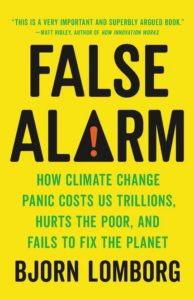“Skeptical environmentalist” and creator of the Copenhagen Consensus Bjorn Lomborg has a new book, False Alarm: How Climate Change Panic Costs Us Trillions, Hurts the Poor, and Fails to Fix the Planet.
Lomborg contends that there are far better ways to build a healthy, prosperous future than the panicked efforts led by the United Nations, many state and local governments, and environmental activists to zero out carbon dioxide emissions in what promises to be a futile effort to reverse the upward climb of CO2 in the atmosphere.
Lomborg claims that prodigious economic growth is inevitable whether or not we attack climate change, though the climate cost will be higher if we fail to enact universal carbon taxes. As evidence, he cites a 2017 Intergovernmental Panel on Climate Change (IPCC) study that examined five different plausible scenarios for the future.
The authors found that all five pathways lead to increased prosperity, from a 170% increase in GDP by 2100 (regional rivalry  fueled by nationalism) to a 1,040% increase from fossil-fueled development that, yes, does allow for increasing CO2. The next-best result, a 600% increase, is from the sustainable development (green road) pathway; this, Lōmborg says, yields the lowest temperature rise.
fueled by nationalism) to a 1,040% increase from fossil-fueled development that, yes, does allow for increasing CO2. The next-best result, a 600% increase, is from the sustainable development (green road) pathway; this, Lōmborg says, yields the lowest temperature rise.
Five centuries down the road, the total world GDP should be $4,629 trillion a year. Using a “dynamic climate-economy model” created by Nobel laureate William Nordhaus, Lōmborg concludes that a carbon tax designed to limit global temperature increases to 6.3o F will result in the lowest combined cost of climate damage and climate policy expenditures.
While all of these (and other) calculations in this book are impressive, climate realists should be very skeptical over their real-world importance. Global temperatures have been flat for the first two decades of the 21st Century. Moreover, as climate scientist Roy Spencer reports, just for the American Midwest, the doomsayer climate models are overestimating warming by 600%.
German scientist Fritz Vahrenholt points out that the mean temperature rise since 1981 has remained unchanged at 0.14o C per decade — or a projected 1.4o C (2.52o F) over the 21st Century. This is far less than the lowest temperature rise projected by Lōmborg and the UN, indicating there is no need for a carbon tax that negatively impacts the poor and middle class.
And a carbon tax would seriously impact the poorest among us. Lōmborg predicts that while climate change may cost developed countries a few dollars, the hit on African nations could be as much as 10% of their GDP. Poor communities in the U.S. and the United Kingdom will also be worse off if carbon taxes are implemented. In fact, while advocating for a carbon tax, Lomborg argues that cutting CO2 emissions is an “incredibly ineffective” way to improve the lives of the world’s poor.
To wit, he cites a 2018 Nature Climate Change article that shows strong global climate action would cause far more hunger and food insecurity than climate change itself. The impact on energy prices, together with impacts on agricultural producers, food manufacturers, and the transport sector will raise the cost of food by a projected 110% by 2050 and force 78 million people into starvation.
In sum, Lomborg concludes, Africans may lose much less prosperity to climate change if nations follow the IPCC’s “sustainability” (green) pathway, but they will be far better off overall from adhering to the fossil fuel pathway – more than 30 times more prosperous by 2100 (compared to just 19 times better off following the greener path.
Lomborg goes on to discuss the urgent need for African prosperity as a higher priority than African green energy. He even says that lifting societies out of poverty is a much more important pathway to eradicating malaria than climate action, because as people get more prosperous, they can afford medicine that will help end malaria’s reign of terror.
While Lomborg favors a carbon tax, he still admits that high energy prices kill people, mainly the poor and elderly. And yet, he notes, the World Bank and other lenders have directed more and more aid to “climate-related development finance,” which means no fossil-fuel power plants – and more deaths. Indeed, Lomborg laments that many of our political leaders have decided that climate spending trumps ending poverty.
In addition to the unnecessary carbon tax (given the overestimates of temperature rise in the models), Lomborg urges governments to invest much more heavily in research and development and seek innovative ways to improve the climate and bring prosperity especially to the poorest.
One such innovation, he recounts, was the work of the late Nobel laureate Norman Borlaug, who helped innovate new, better varieties of wheat, rice, and maize. Fracking, too, was an innovation that has lowered energy costs and thus brought new prosperity to millions. Lōmborg also encourages R&D for energy storage and nuclear energy.
Adaptation is also a valuable strategy for combating climate change, says Lōmborg. This includes everything from building dikes and overflow reservoirs to floodplain management and increased air conditioning. Once again, the poor have fewer resources to spend on adaptation, so raising their standard of living remains the best “climate” strategy for them. He also mentions geoengineering, an option that is fraught with great uncertainty.
To illustrate the benefits of prosperity, Lōmborg compares the Netherlands to Bangladesh. Both countries have low-lying areas subject to flooding, but the Dutch have spent billions on flood prevention, building and improving dikes and drainage canals. Bangladeshis, by contrast, are seeing even higher human and property costs from flooding than when it had far fewer people. Yet their potential for increased prosperity would also soar. Ending poverty is, by far, the world’s best weapon against climate change.
Lomborg alleges that the goal of climate policy “is” to make the world a better place. While that should be the goal of all governmental policies, the evidence does not support that statement. Indeed, UN leaders like Christiana Figueres have informed us that the goal of THEIR climate policy is “to intentionally transform the economic development model, for the first time in human history,” that is, to abolish capitalism in favor of a centralized (UN led) world government.
But back to Lomborg, whose entire zeitgeist has been to look at the bigger picture. He asserts that the quality of life has been on an upswing for quite some time and that climate change is a moderate problem in a sea of problems. He is weary of the blatant lies and apocalyptic misstatements that have not been debunked thoroughly and have in many cases led us to focus on the wrong problems.
Lomborg advocates for freer trade, along with investments in health care, education, and technology. He says that freer trade could unleash “an amazing $2,000 of social benefits for every dollar spent,” with many of the benefits going to the world’s poorest. And that is the most valuable information in this book – that the solution to poverty, slavery, and other miseries is policies and actions that elevate the standard of living for the poorest among us.
